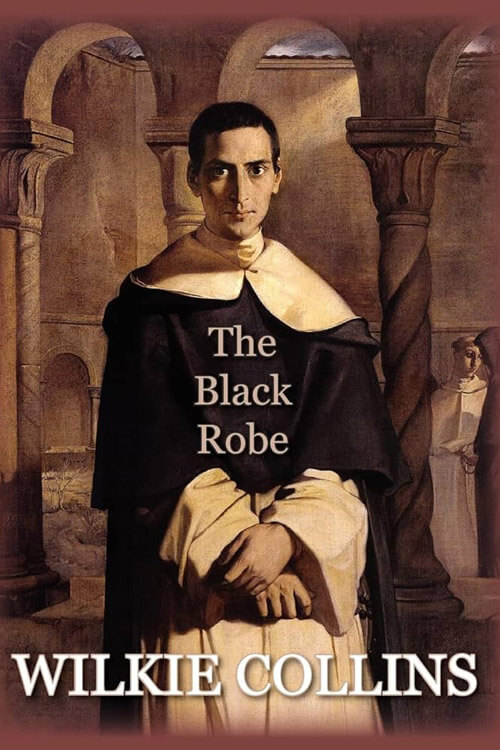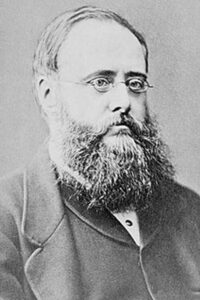
The Black Robe
I followed him into the church. He knelt in a dark corner by himself. I confess I was surprised. He had been baptized in the Church of England, but so far as outward practice was concerned, he belonged to no religious community. I had often heard him speak with sincere reverence and admiration of the spirit of Christianity—but he never, to my knowledge, attended any place of public worship. When we met again outside the church, I asked if he had been converted to the Roman Catholic faith.
“No,” he said. “I hate the inveterate striving of that priesthood after social influence and political power as warmly as the fiercest Protestant living. But let us not forget that the Church of Rome has great merits to set against great faults. Its system is administered with an admirable knowledge of the higher needs of human nature. Take as one example what you have just seen. The solemn tranquillity of that church, the poor people praying near me, and the few words of prayer I silently united myself to my fellow creatures have calmed me and done me good. I should have found the church closed in our country, out of service hours.” He took my arm and abruptly changed the subject. “How will you occupy yourself,” he asked, “if my aunt receives me tomorrow?”
I assured him I should easily find ways to get through the time. The following day, Lady Berrick sent a message saying she would see her nephew after breakfast. Left by myself, I walked toward the pier and met with a man who asked me to hire his boat. He had lines and bait at my service. Most unfortunately, as the event proved, I decided to spend an hour or two by sea fishing.
The wind shifted while we were out, and before we could get back to the harbour, the tide had turned against us. It was six o’clock when I arrived at the hotel. A little open carriage was waiting at the door. I found Romayne impatiently expecting me and no signs of dinner on the table. He informed me that he had accepted an invitation, which I was included, and promised to explain everything in the carriage.
Our driver took the road that led toward the High Town. I subordinated my curiosity to my sense of politeness and asked for news of his aunt’s health.
Read or download Book
Wilkie Collins
William Wilkie Collins (8 January 1824 – 23 September 1889) was an English novelist and playwright known especially for The Woman in White (1859), a mystery novel and early sensation novel, and for The Moonstone (1868), which established many of the ground rules of the modern detective novel and is also perhaps the earliest clear example of the police procedural genre.
Biography.
Born to the London painter William Collins and his wife, Harriet Geddes, he moved with them to Italy when he was twelve, living there and in France for two years, learning both Italian and French. He worked initially as a tea merchant. After Antonina, his first novel, was published in 1850, Collins met Charles Dickens, who became his friend and mentor. Some of Collins’ work appeared in Dickens’ journals Household Words and All the Year Round. They also collaborated on drama and fiction. Collins gained financial stability and an international following by the 1860s, but in the 1870s and 1880s, after becoming addicted to the opium he took for his gout, the quality of both his health and his writing declined.
Collins criticized the institution of marriage. He had relationships with two women: widow Caroline Graves – living with her for most of his life, treating her daughter as his – and the younger Martha Rudd, with whom he had three children.
Early life
Collins was born at 11 New Cavendish Street, London, the son of William Collins, a well-known Royal Academician landscape painter, and his wife, Harriet Geddes. Named after his father, he soon became known by his middle name, which honored his godfather, the painter David Wilkie. The family moved to Pond Street, Hampstead, in 1826. In 1828 Collins’s brother Charles Allston Collins was born. Between 1829 and 1830, the Collins family moved twice, first to Hampstead Square and then to Porchester Terrace, Bayswater. Wilkie and Charles received their early education from their mother at home. The Collins family was deeply religious, and Collins’s mother enforced strict church attendance on her sons, which Wilkie disliked.
In 1835, Collins began attending school at the Maida Vale Academy. From 1836 to 1838, he lived with his parents in Italy and France, which made a great impression on him. He learned Italian while in Italy and began learning French, in which he would eventually become fluent. From 1838 to 1840, he attended the Reverend Cole’s private boarding school in Highbury, where he was bullied. One boy forced Collins to tell him a story every night before allowing him to go to sleep. “It was this brute who first awakened in me, his poor little victim, a power of which but for him I might never have been aware…. When I left school I continued storytelling for my pleasure,” Collins later said.
In 1840 the family moved to 85 Oxford Terrace, Bayswater. In late 1840, Collins left school at the age of nearly 17 and was apprenticed as a clerk to the firm of tea merchants Antrobus & Co., owned by a friend of Wilkie’s father. He disliked clerical work but worked for the company for more than five years.
Collins started writing and published his first story, “The Last Stage Coachman”, in the Illuminated Magazine in August 1843. In 1844 he traveled to Paris with Charles Ward. That same year he wrote his first novel, Iolani, or Tahiti as It Was; a Romance, which was submitted to Chapman and Hall but rejected in 1845. The novel remained unpublished during his lifetime. Collins said of it: “My youthful imagination ran riot among the noble savages, in scenes which caused the respectable British publisher to declare that it was impossible to put his name on the title page of such a novel.” While Collins was writing this novel, his father first learned that his son would not follow him in becoming a painter.
William Collins had intended his first son to become a clergyman and was disappointed in Wilkie’s lack of interest in the profession. At his father’s insistence, Collins instead entered Lincoln’s Inn in 1846, to study law; his father wanted him to have a steady income. Collins showed only a slight interest in law and spent most of his time with friends and working on a second novel, Antonina, or the Fall of Rome. After his father died in 1847, Collins produced his first published book, Memoirs of the Life of William Collins, Esq., R. A., published in 1848.
The family moved to 38 Blandford Square soon afterward, where they used their drawing room for amateur theatricals. In 1849, Collins exhibited a painting, The Smugglers’ Retreat, at the Royal Academy summer exhibition. Antonina was published by Richard Bentley in February 1850. Collins went on a walking tour of Cornwall with artist Henry Brandling in July and August 1850. He managed to complete his legal studies and was called to the bar in 1851. Though he never formally practiced, he used his legal knowledge in many of his novels.
Early writing career
An instrumental event in his career was an introduction in March 1851 to Charles Dickens by a mutual friend, the painter Augustus Egg. They became lifelong friends and collaborators. In May of that year, Collins acted with Dickens in Edward Bulwer-Lytton’s play Not So Bad As We Seem. Among the audience were Queen Victoria and Prince Albert. Collins’s story “A Strange Bed”, his first contribution to Dickens’s journal Household Words, was published in April 1852. In May 1852 he went on tour with Dickens’s company of amateur actors, again performing Not So Bad As We Seem, but with a more substantial role.
Collins’s novel Basil was published by Bentley in November. During the writing of Hide and Seek, in early 1853, Collins suffered what was probably his first attack of gout, a condition from which he would suffer for the rest of his life. He was ill from April to early July. After that, he stayed with Dickens in Boulogne from July to September 1853, then toured Switzerland and Italy with Dickens and Egg from October to December. Collins published Hide and Seek in June 1854.
During this period Collins extended the variety of his writing, publishing articles in George Henry Lewes’s paper The Leader, short stories and essays for Bentley’s Miscellany, as well as dramatic criticism and the travel book Rambles Beyond Railways. His first play, The Lighthouse, was performed by Dickens’s theatrical company at Tavistock House, in 1855. His first collection of short stories, After Dark, was published by Smith, Elder in February 1856. His novel A Rogue’s Life was serialized in Household Words in March 1856. Around then, Collins began using laudanum regularly to treat his gout. He became addicted and struggled with that problem later in life.
Collins joined the staff of Household Words in October 1856. In 1856–57 he collaborated closely with Dickens on a play, The Frozen Deep, first performed in Tavistock. Collins’s novel The Dead Secret was serialized in Household Words from January to June 1857, before being published in volume form by Bradbury and Evans. Collins’s play The Lighthouse was performed at the Olympic Theatre in August. His account, The Lazy Tour of Two Idle Apprentices, based on Dickens’s and Collins’s walking tour in the north of England, was serialized in Household Words in October 1857. In 1858 Collins collaborated with Dickens and other writers on the story “A House to Let”.






